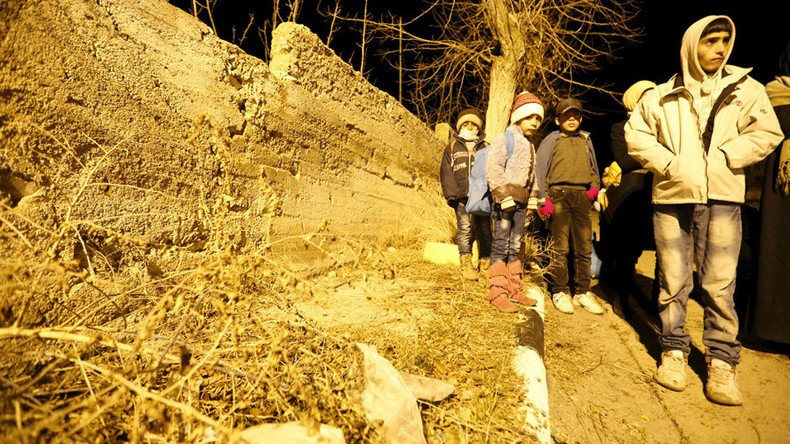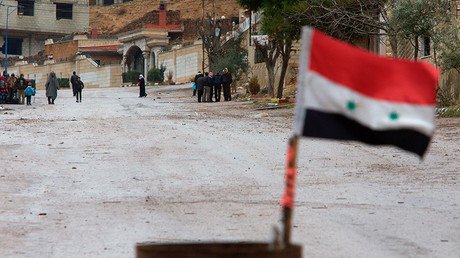Humanitarian aid to besieged areas is duty, not some ‘credibility test’ – Damascus

The Syrian government’s commitment to allowing aid to besieged territories will soon be “tested,” a UN peace envoy stated, sparking criticism from Damascus which rejected the idea of testing or somehow linking its fundamental humanitarian duty to any peace talks.
“So far I understand that the Government of Syria has approved access to seven besieged areas,” Vanessa Huguenin, spokeswoman for the United Nations Office for the Coordination of Humanitarian Affairs (OCHA) said as cited by AFP.
“Humanitarian agencies and partners are preparing convoys for these areas, to depart as soon as possible in the coming days,” she added.
The list of the areas which are going to be provided with humanitarian aid involves towns in in the province of Idlib as well as in rural Damascus, according to Huguenin. The areas are besieged by different parties in the Syrian conflict: Deir el-Zor by Islamic State (IS, formerly ISIS/ISIL); Foah and Kefraya by the so-called moderate opposition while Madaya, Madamiyet Elsham, Kafr Batna and Zabadani by the government troops.
The announcement was made during UN special envoy for Syria Staffan de Mistura’s visit to Damascus on Tuesday.
“It is clear it is the duty of the government of Syria to want to reach every Syrian person wherever they are and allow the UN to bring humanitarian aid, particularly now after so long time,” de Mistura said after his meeting with Walid Muallem, Syrian Foreign Minister.
“Tomorrow we will have a test of that [duty] and we will be able to talk more about it,” de Mistura added after the “meaningful meeting,” Xinhua reports.
In the meantime Damascus said the government’s humanitarian responsibilities should not be linked to any meetings or the temporarily delayed Geneva peace talks, adding that “the Syrian government doesn't allow Mistrura or anyone else to speak about testing the seriousness of Syria in any subject whatsoever.”
“Syria now needs to test the truthfulness of the UN envoy,” the ministry added.
Muallem reaffirmed that the Syrian government never stopped and will continue its efforts to deliver relief to all citizens, particularly “in the areas controlled by terrorist groups.”
The humanitarian situation in Syria has attracted a great deal of attention from the international community over the past months. The western media has been blaming the Syrian government for being responsible for the humanitarian disaster in the besieged town of Madaya.
In the wake of renewed interest in the suffering of civilians during the five-year-long Syrian conflict, last month the UN reported that about 400,000 civilians in 15 besieged locations were in urgent need of emergency assistance.
‘Govt aid was sold off by traders’: RT reports from besieged Madaya (EXCLUSIVE) https://t.co/yPreliSHkfpic.twitter.com/krVpnYX5xm
— RT (@RT_com) January 12, 2016
“With many families unable to move, and food becoming scarce, expensive, and risky to access, starvation and hunger is now a grave threat that affects over 4 million Syrians living in hard to reach areas,” United Nations human rights expert Hilal Elver added, welcoming humanitarian corridors to the towns of Madaya, Foah and Kefraya.
Russian army launches humanitarian op in Syria'Russia will provide the Syrian people with all possible help to liberate the country from extremists and return peace to the nation.'
Posted by RT Play on Friday, 15 January 2016
These somewhat one-sided accusations about Damascus being the main party responsible for the humanitarian crisis in the conflict torn country were criticized by Russian Foreign Minister Sergey Lavrov who called them part of an information war.
“Just for how long can you talk about 40,000 civilians in Madaya not getting enough food, medicine, and other basic necessities because they are surrounded by government troops, and at the same time turn a blind eye to the fact that 200,000 people have been surrounded by Islamic State fighters and other militants in the city of Deir ez-Zor?” Lavrov said in interview with Russian daily MK last week.
Amid the international efforts to arrange inclusive reconciliation talks between the Syrian conflict parties, some “partners” have tried to “turn the humanitarian situation in Syria into almost a measure of the ability to take further steps towards reaching a political settlement [of the crisis], making its resolution a preliminary precondition for starting any meaningful talks between the Syrians,” Lavrov said, adding that Moscow is also increasingly being accused of aggravating the situation by conducting its air campaign against terrorist groups in Syria.













